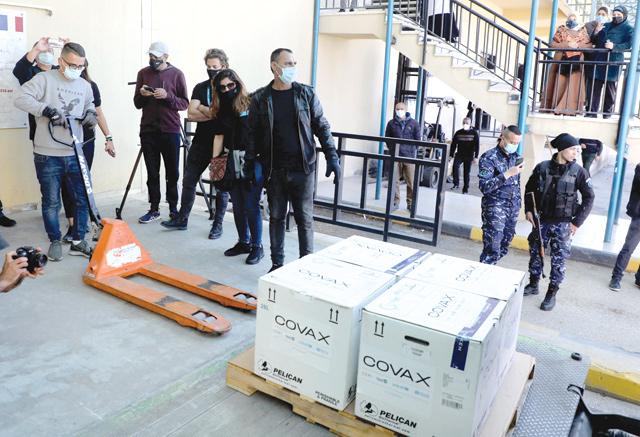You are here
Iraq gets 1.2 million doses of Pfizer COVID vaccine
By AFP - Nov 20,2021 - Last updated at Nov 20,2021
BAGHDAD — Iraq said on Saturday it has received 1.2 million doses of Pfizer-BioNTech's COVID-19 vaccine through the Covax sharing scheme, amid fears of a fourth wave in the country.
Nearly 7 million Iraqis have received at least one dose of coronavirus vaccine, amounting to 17.5 per cent of the country's 40 million population, based on government figures.
Plagued by years of conflict, corruption and neglect, Iraq's health system has struggled to cope with the pandemic.
The health ministry announced on Saturday the arrival of a shipment of more than 1.2 million doses of "Pfizer's anti-COVID vaccine through the Covax programme and UNICEF", the UN Children's Fund.
"Iraq is still facing danger from the coronavirus pandemic," ministry spokesman Saif Al Badr said on Thursday.
"We expect to enter a fourth wave, [and] it could be a new variant," he told state television.
More than 2 million Iraqis have been infected with COVID and 23,628 have died in Iraq since the outbreak of the pandemic, according to official figures.
Despite an increase in the number of people getting jabbed, Iraq’s government has been unable to overcome general scepticism about vaccines and measures aimed at preventing the spread of the virus.
There is a high level of public mistrust of institutions in Iraq amid the circulation of misleading information about the pandemic.
Covax was set up to ensure equitable distribution of vaccines, particularly to low-income countries, and has already delivered more than 80 million doses to 129 territories.
Related Articles
GENEVA — The Covax global programme, which has relied heavily on AstraZeneca vaccines, said on Monday it has struck a deal to buy 500 millio
BAGHDAD — Iraq on Sunday received a donation of more than 100,000 AstraZeneca doses against COVID-19 from Italy via vaccine-sharing facility
RAMALLAH, Palestine — Palestinians on Wednesday received their first delivery of coronavirus vaccines via the United Nations Covax programme












